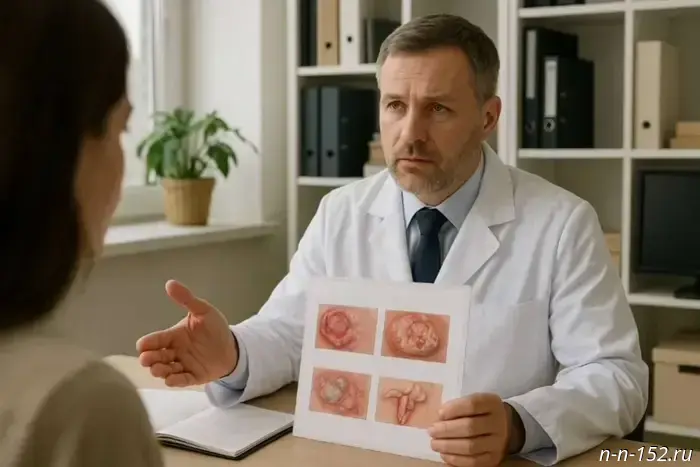
Doctor Efstafyev warned Nizhny Novgorod residents about hidden sexual infection threats
July 14, 2025, 09:00
[211]
Society From July 14 to 20, Russia is observing the Week of Sexual Transmitted Disease (STD/STI) Prevention. This initiative annually reminds us of the importance of a conscious attitude towards personal health, especially in the realm of intimate relationships. Despite the widespread prevalence of such infections, societal attitudes towards them remain insufficiently serious. Meanwhile, the consequences of STDs/STIs can be not just unpleasant but can literally undermine health for many years.
Vasily Efstafiev, the chief doctor of the Nizhny Novgorod Regional Dermatovenerological Dispensary, helped shed light on the specifics of sexually transmitted infections and ways to protect against them.
What Lies Behind the Abbreviation STD/STI
According to the specialist, currently, 31 diseases are known to be transmissible through sexual contact. Many of these do not present clear symptoms, causing infected individuals often to be unaware they are carriers of the infection.
"In my practice, I most often encounter diseases such as syphilis, gonorrhea, chlamydia, and trichomoniasis. All are dangerous, especially if not treated promptly," emphasized Vasily Efstafiev.
Infection transmission can occur through any form of sexual contact—not only traditional, but also anal or oral. Some pathogens inhabit not only the mucous membranes of sexual organs but also the oral cavity, anal area, and even in the blood. The infection can develop silently, without causing noticeable symptoms, yet it is precisely during this period that a person poses the greatest risk to their partner.
Self-medication can lead to disaster
One of the most common mistakes is attempting to deal with the disease independently. Efstafiev warns: any suspicion of symptoms should be a reason to visit a dermatologist and venereologist, not for self-diagnosis or self-treatment.
"Without qualified help, you can not only fail to eliminate the infection but also worsen its course. The earlier treatment begins, the higher the chance to avoid complications," the doctor said.
STDs/STIs can lead to serious consequences: in men, prostatitis, orchitis, erectile dysfunction, and infertility; in women, chronic pelvic inflammatory disease, fertility issues, and ectopic pregnancy.
When and how to get tested
Even if there are no signs of illness after unprotected sex, testing is still necessary (just to be safe). The timing of diagnostics depends on the specific disease. Gonorrhea can be detected within 3-5 days after contact, trichomoniasis within 5-7 days, herpes within two weeks. Syphilis diagnostics are possible after about a month, hepatitis B and C after two months, and HIV no earlier than three months.
Symptoms that require immediate medical attention include burning or pain during urination, genital discharges, itching, irritation, ulcers, lumps in the genital or anal area, rash, swollen inguinal lymph nodes, or lower abdominal pain. However, the absence of symptoms does not guarantee the absence of disease.
"Some infections can be asymptomatic, and in such cases, a person may be a source of infection without knowing it," explained Efstafiev.
The best way to protect yourself is to practice safe sex. The most reliable protection remains a condom. However, the main emphasis by the specialist is on stable sexual relationships.
"Having one loyal and consistent partner is the optimal protection against sexual infections," assured the doctor.
NIА "Nizhny Novgorod" has a Telegram channel. Subscribe to stay informed about major events, exclusive materials, and timely updates. © 1999–2025 NIА "Nizhny Novgorod." When reprinting, a hyperlink to NIА "Nizhny Novgorod" is mandatory. This resource may contain 18+ materials.
Другие Новости Нижнего (Н-Н-152)
 84% of Nizhny Novgorod teenagers decide for themselves where to enroll.
News of Nizhny Novgorod
84% of Nizhny Novgorod teenagers decide for themselves where to enroll.
News of Nizhny Novgorod
 Vulnerable residents of the Nizhny Novgorod modeling agency have appealed to Bastrykin.
Nizhny Novgorod residents affected by the activities of the MaryWay modeling agency have appealed to the Chairman of the Investigative Committee of Russia, Alexander Bastrykin, to assist with the investigation of a large-scale fraud case. July 14, 2025. NIAN Nizhny Novgorod. Nizhny Novgorod Region. Nizhny Novgorod.
Vulnerable residents of the Nizhny Novgorod modeling agency have appealed to Bastrykin.
Nizhny Novgorod residents affected by the activities of the MaryWay modeling agency have appealed to the Chairman of the Investigative Committee of Russia, Alexander Bastrykin, to assist with the investigation of a large-scale fraud case. July 14, 2025. NIAN Nizhny Novgorod. Nizhny Novgorod Region. Nizhny Novgorod.
 Pavlovsk residents were served 300 kg of sausages and frankfurters in honor of City Day.
"Pavlovskaya Chicken" prepared 300 kg of sausages and wieners to treat Pavlov residents at the city day celebration held on July 12th. 14.07.2025. vGorodeN.Ru. Nizhny Novgorod Region. Nizhny Novgorod.
Pavlovsk residents were served 300 kg of sausages and frankfurters in honor of City Day.
"Pavlovskaya Chicken" prepared 300 kg of sausages and wieners to treat Pavlov residents at the city day celebration held on July 12th. 14.07.2025. vGorodeN.Ru. Nizhny Novgorod Region. Nizhny Novgorod.
 Warm and sunny weather is expected in Nizhny Novgorod during the new work week.
The temperature will reach +27 degrees during the new workweek in Nizhny Novgorod. July 14, 2025. Nizhny Novgorod Truth. Nizhny Novgorod Region. Nizhny Novgorod.
Warm and sunny weather is expected in Nizhny Novgorod during the new work week.
The temperature will reach +27 degrees during the new workweek in Nizhny Novgorod. July 14, 2025. Nizhny Novgorod Truth. Nizhny Novgorod Region. Nizhny Novgorod.
 Starting July 14, the Nizhny Novgorod Forestry Department will begin issuing permits for hunting game birds.
Source: Press Service of the Governor and Government of the Nizhny Novgorod Region
In the Nizhny Novgorod Region, permits for hunting game birds with setters and falconry birds will begin to be issued from July 14, 2025. July 14, 2025. Selskaya Tribuna Newspaper. Nizhny Novgorod Region. Pilna.
Starting July 14, the Nizhny Novgorod Forestry Department will begin issuing permits for hunting game birds.
Source: Press Service of the Governor and Government of the Nizhny Novgorod Region
In the Nizhny Novgorod Region, permits for hunting game birds with setters and falconry birds will begin to be issued from July 14, 2025. July 14, 2025. Selskaya Tribuna Newspaper. Nizhny Novgorod Region. Pilna.
 Knives and a flask became the grounds for liability.
Thanks to the vigilance and professionalism of the bailiffs ensuring the established order of the Dzherzhinsky District Court of the Nizhny Novgorod Region, an attempt by visitors on 14.07.2025 was thwarted. UFSisp Nizhny Novgorod Region. Nizhny Novgorod Region. Nizhny Novgorod.
Knives and a flask became the grounds for liability.
Thanks to the vigilance and professionalism of the bailiffs ensuring the established order of the Dzherzhinsky District Court of the Nizhny Novgorod Region, an attempt by visitors on 14.07.2025 was thwarted. UFSisp Nizhny Novgorod Region. Nizhny Novgorod Region. Nizhny Novgorod.
Doctor Efstafyev warned Nizhny Novgorod residents about hidden sexual infection threats
News of Nizhny Novgorod
